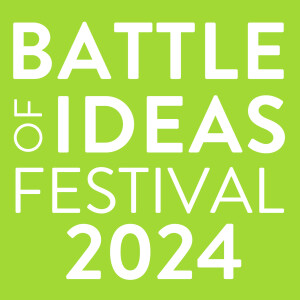
Wednesday Apr 02, 2025
The queering of society
Recorded at the Battle of Ideas festival 2024 on Saturday 19 October at Church House, Westminster.
ORIGINAL INTRODUCTION
The word ‘queer’ has had many iterations. First it meant ‘strange’, ‘odd’ or even ‘eccentric’ – think of the expression, ‘there’s nowt so queer as folk’. During the trial of Oscar Wilde, a letter by the Marquis of Queensberry described Wilde and other gay men as ‘snob queers’. Indeed, for many, the term still produces a wince, as it took on the form of a homophobic slur.
Today, however, ‘queer’ has been adopted positively, falling under the LGBTQ+ umbrella representing those whose ‘gender identity’ or sexuality does not fit into ‘cisgender’ norms. No longer just a word, the concept of ‘queering’ has now emerged – a technique to challenge binaries, boundaries and ‘heteronormativity’ across society as a whole. While originally associated with the takeover of Pride events by queer activism, queering is now visible in everyday life – it is impossible to walk down a UK high street and not see ‘queer’ symbolism in the shape of flags or traffic signs.
Applying a queering methodology is inevitably pervasive in academia, but increasing numbers of artistic or cinematic works now incorporate ‘non-binary’ or ‘queer’ figures. This can involve re-writing history – for example, the recent Paris Olympics opening ceremony, which portrayed what seemed to be the Last Supper complete with drag queens and men sporting thongs. Shakespeare’s Globe Theatre queered Joan of Arc (they/them) in its production of I, Joan. Even items recovered in the sixteenth-century shipwreck, Mary Rose, from nit combs to gold rings, have been reassessed through a ‘queer lens’.
Queering can also apply to thinking about the future – a recent report published by Queen’s University Belfast encouraged a gender-inclusive approach to discussion of the Northern Irish border by ‘queering the peace process’. Queers for Palestine are a regular feature on Gaza protests, arguing that we should ‘unpack the multiple intersections of queer politics and the Palestinian struggle’. Likewise, there are calls to queer the education system and curriculum to ‘encourage intersectional ways of thinking’ among primary-age children; to allow them to appreciate the tyranny of boundaries.
Critics of queering argue that this clashes with the reality of most people’s lived experiences in which rules, boundaries and norms are, well, normal. For example, referring to the debate about transwomen’s access to women-only spaces, tennis legend Martina Navratilova tweeted: ‘All our lives we are taught about boundaries, we teach our children about boundaries and now we women are supposed to give them all up for males?’
What is behind this complete shifting of language and the attempt to re-write the past, present and future through a ‘queer lens’? Is queering simply a new way of looking at the world, one which we should embrace with an attitude of ‘live and let live’? Or is there something to be defended in our understanding of binaries and boundaries, that help our understanding of each other rather than harm?
SPEAKERS
James Esses
barrister; social commentator; co-founder, Thoughtful Therapists
Professor Frank Furedi
sociologist and social commentator; executive director, MCC Brussels
Kate Harris
co-founder and trustee, LGB Alliance; formerly Brighton Women’s Centre and Brighton Women’s Aid
Graham Linehan
creator and co-creator, Father Ted, Black Books and The IT Crowd; comedy writer, Count Arthur Strong, Brass Eye and The Fast Show; author, Tough Crowd: How I Made and Lost a Career in Comedy
CHAIR
Claire Fox
director, Academy of Ideas; independent peer, House of Lords; author, I STILL Find That Offensive!
No comments yet. Be the first to say something!